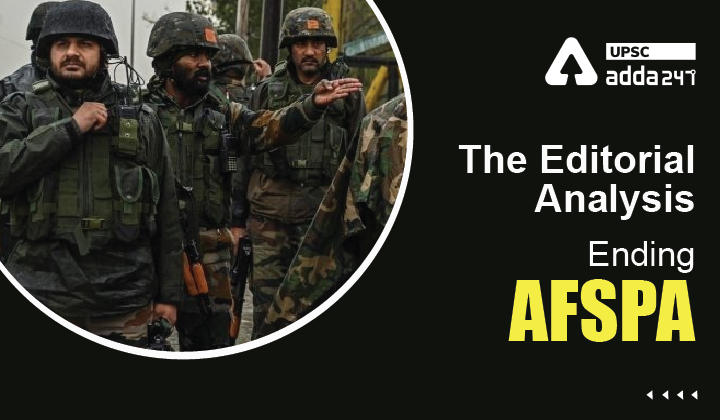Table of Contents
AFSPA UPSC: Relevance
- GS 3: Role of external state and non-state actors in creating challenges to internal security.
About AFSPA: Context
- Recently, the Prime Minister has given the first authentic indication that the operation of the Armed Forces (Special Powers) Act (AFSPA) may come to an end in the whole of the north-eastern region, if ongoing efforts to normalise the situation bear fruit.
AFSPA removal from states
- Areas notified as ‘disturbed areas’ under AFSPA have been reduced in the last few years, mainly due to the improvement in the security situation.
- About a month ago, the Union Home Ministry reduced such notified areas considerably in Assam, Nagaland and Manipur.
- There was a substantial reduction in Assam, where AFSPA was removed entirely in 23 districts and partially in one.
- The Prime Minister has cited “better administration” and the “return of peace” as the reasons for the removal of AFSPA in these areas in a region that has seen insurgencies for decades.
- AFSPA was revoked in Tripura in 2015 and in Meghalaya in 2018.
- The exclusion of an area from AFSPA’s purview can be linked with reduction in violence by armed groups, improvement in the security situation and an increase in development activity.
Additional information
What is AFSPA?
- The AFSPA Act was first promulgated by the British in response to the Quit India movement in 1942.
- After Independence, Indian government decided to retain the Act in 1958.
- AFSPA law provides for special powers to the armed forces that can be imposed by the Centre or the Governor of a state, after it is declared “disturbed’’ under Section 3 of AFSPA.
- The Act defines these as areas that are “disturbed or dangerous condition that the use of armed forces in aid of the civil power is necessary’’.
AFSPA criticisms
- Nagaland and Mizoram faced the brunt of AFSPA in the 1950s, including air raids and bombings by the Indian military.
- The Malom massacre in 2000 in Manipur, and the killing and alleged rape of Thangjam Manorama led to the subsequent repeal of AFSPA from the Imphal municipal area.
- Fake encounters: EEVFAM (Extra Judicial Execution Victims Families Association) has alleged that since the 1970s, there have been 1,528 fake encounters in Manipur alone.
- Human rights activists have said the Act has often been used as a quid pro quo where forces and some people with vested interest settle private scores, such as property disputes, with false tip-offs provided by local informants to security forces.
- Allegations have been made against security forces of mass killings and rape.
- Probing issue: Barring one Army major, who was accused of fake encounter of 12-years old Azad Khan’s death in 2009, no prosecution has been made against security forces in other cases. The Army major himself was persecuted after 9 years in 2018.
- Activists also note that AFSPA creates an atmosphere of impunity among even state agencies.
Supreme Court on AFSPA
- In 2016, the Supreme Court rebuked the government over the continuation of AFSPA.
- The SC judgment clarified that the notion that the Act provides a free hand to security forces is flawed.
- The Court has held that due process needs to be followed in civilian complaints reported from areas under the AFSPA and that the Act doesn’t provide blanket immunity to army personnel in anti-insurgency operations.
- The apex court has even said that the continuance of the Act in any region for extended periods symbolises “failure of the civil administration and the armed forces”.
Read current affairs for UPSC





 TSPSC Group 1 Question Paper 2024, Downl...
TSPSC Group 1 Question Paper 2024, Downl...
 TSPSC Group 1 Answer key 2024 Out, Downl...
TSPSC Group 1 Answer key 2024 Out, Downl...
 UPSC Prelims 2024 Question Paper, Downlo...
UPSC Prelims 2024 Question Paper, Downlo...




